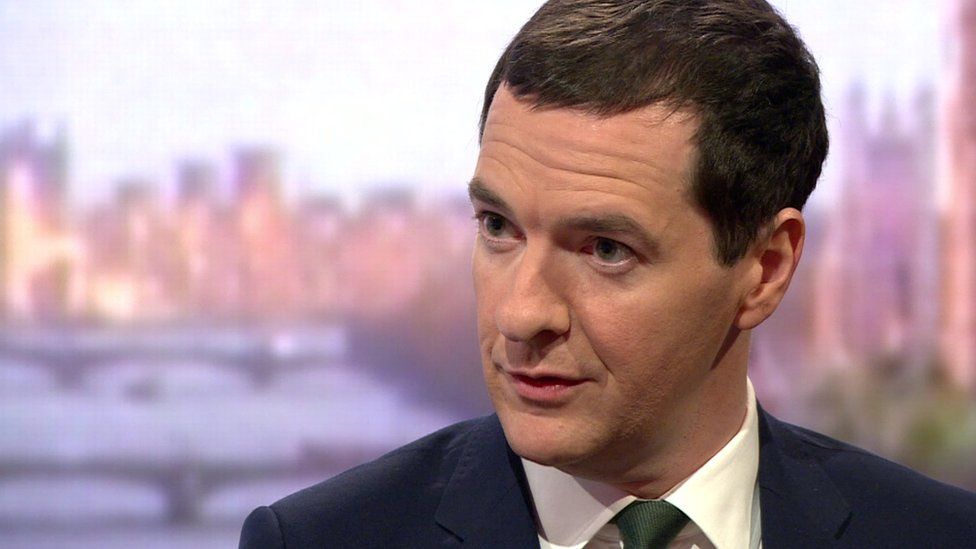Spending Review: Osborne under pressure on tax credits
- Published

George Osborne is refusing to be drawn on how he will claw back the £4.3bn cost of postponing tax credit cuts in Wednesday's Spending Review.
Labour claims the chancellor is planning cuts to Universal Credit, which is set to replace six working age benefits by 2020.
He is thought to have scrapped a plan to cut work incentives after Iain Duncan Smith threatened to resign.
But Labour claims he is likely to find another way of cutting the benefit.
The party seized on a comment by Mr Osborne in an interview with the BBC's Andrew Marr, in which he said: "Largely unnoticed, in the last week, the House of Commons has just passed multi billion pound savings in our welfare budget."
Labour believes this was a reference to a vote on Thursday by the delegated legislation committee, which backed a move to change Universal Credit work allowances.
The change is designed to save about £2.5bn in the welfare budget.
Single parents
Speaking to the committee, shadow employment secretary Emily Thornberry said: "The most startling effect will be on households with no dependent children. Whether singles or couples, they will no longer have any work allowance at all.
"From the moment they start working, they will lose benefits."
She claimed the change would be "likely to cause losses of between £800 and £900 a year".
Single parents would see the amount they can earn before their benefits are cut halved under the changes, she claimed.
What are tax credits?
Tax credits have nothing to do with tax. They are benefit payments for parents, disabled people and people on low incomes.
They were introduced by Gordon Brown to lift families out of poverty but the current government believes they are too expensive and are effectively a subsidy for firms that won't pay a living wage.
There are two types - Working Tax Credits (WTC) and Child Tax Credits (CTC), which people with children can claim if they are not working. It is possible to claim both at the same time, with the overall amount worked out using a complicated formula.
Chancellor George Osborne wanted to cut the amount someone could earn before they started losing WTC payments from £6,420 to £3,850, and from £16,105 to £12,125 for those on CTC only.
The rate at which the payments are cut would also have been speeded up. Currently, for every £1 claimants earn above the earnings threshold, they lose 41p. But from April, it would have been 48p.
Tax credits are due to be replaced by a new benefit, Universal Credit.
Read more:
Employment Minister Priti Patel replied: "The changes to the work allowance should be considered as part of the wider package of support for claimants. Universal credit still provides better support than the current system, including by providing dedicated work coaches who can give advice on job applications and interviews."
She said MPs would have to wait until Wednesday's Spending Review to find out how postponing tax credit cuts would be paid for.
'Black box'
Labour concedes that it does not know where Mr Osborne will find the cash to mitigate tax credit cuts, but suspects he will target Universal Credit, which is due to replace tax credits by 2018.
Shadow work and pensions secretary Owen Smith said: "This morning the Chancellor let slip that the government still hopes to try and hide cuts to tax credits in the black box of Universal Credit, but that just won't wash.
"Taking money from Universal Credit is simply rebadging cuts to tax credits, so will throw up all of the same problems for the Tories that the planned cuts caused in the first place."
Work and Pensions Secretary Iain Duncan Smith has reportedly seen off an attempt to increase the Universal Credit "taper rate," which sees claimants lose 65p in benefit for every extra pound they earn over a set threshold.
Treasury officials wanted to increase that to 75p in the pound to gather about £1.5bn to £2bn but the DWP said such a move would deter people from taking extra work, fatally undermining the purpose of Universal Credit which is to "make work pay".
'Legitimate concerns'
In his Marr interview, Mr Osborne was asked how he would mitigate the impact on working families of his proposed cuts to tax credits after they were thrown out by the House of Lords.
He said he would listen to "perfectly legitimate concerns" that low-paid households would suffer dramatic cuts in welfare but insisted election promises to slash £12bn from the welfare budget remained on track.
"For me what is important is where we get to," he said.
"I'm pretty confident that we can deliver what we promised the British people we would deliver at the general election, which is yes, savings in welfare, savings in government departments, but for a purpose, which is the economic security that enables jobs to be created and living standards to rise."
- Published22 November 2015
- Published22 November 2015
- Published24 November 2015